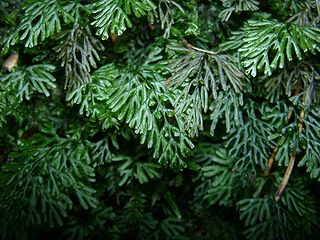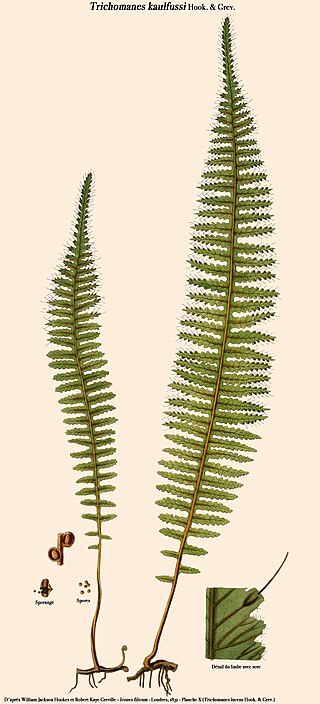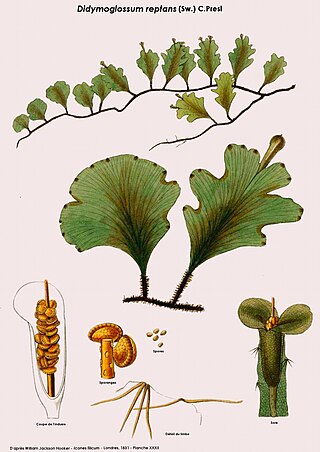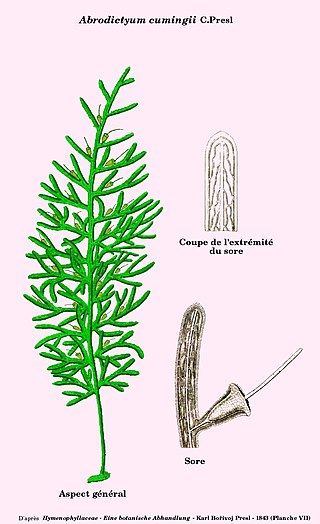
The Hymenophyllaceae, the filmy ferns and bristle ferns, are a family of two to nine genera and about 650 known species of ferns, with a subcosmopolitan distribution, but generally restricted to very damp places or to locations where they are wetted by spray from waterfalls or springs. A recent fossil find shows that ferns of Hymenophyllaceae have existed since at least the Upper Triassic.

Bolbitis is a genus of ferns in the family Dryopteridaceae, subfamily Elaphoglossoideae, in the Pteridophyte Phylogeny Group classification of 2016.

Hymenophyllum is a genus of ferns in the family Hymenophyllaceae. Its name means "membranous leaf", referring to the very thin translucent tissue of the fronds, which gives rise to the common name filmy fern for this and other thin-leaved ferns. The leaves are generally only one cell thick and lack stomata, making them vulnerable to desiccation. Consequently, they are found only in very humid areas, such as in moist forests and among sheltered rocks. They are small and easy to overlook.
Hypnodontopsis is a genus of haplolepideous mosses (Dicranidae) in family Rhachitheciaceae.

Thamnobryum is a genus of moss in the family Neckeraceae. There are about 50 species. The genus is distributed throughout the world.

Trichomanes is a genus of ferns in the family Hymenophyllaceae, termed bristle ferns. The circumscription of the genus is disputed. All ferns in the genus are filmy ferns, with leaf tissue typically 2 cells thick. This thinness generally necessitates a permanently humid habitat, and makes the fronds somewhat translucent. Because of this membrane-like frond tissue, the plant is prone to drying out. “Filmy ferns” in the taxa Hymenophyllaceae grow in constantly wet environments. Many are found in cloud forests such as “Choco” in Colombia. There are also members of the taxa that can grow submersed in water.

Hypnaceae is a large family of moss with broad worldwide occurrence in the class Bryopsida, subclass Bryidae and order Hypnales. Genera include Hypnum, Phyllodon, and Taxiphyllum.

Didymoglossum is a tropical genus of ferns in the family Hymenophyllaceae. It comprises more than 30 epilithic or low-epiphytic species under two subgenera. The genus is accepted in the Pteridophyte Phylogeny Group classification of 2016, but not by some other sources which sink it into a broadly defined Trichomanes.

Ditrichum is a genus of haplolepideous mosses (Dicranidae) in the family Ditrichaceae.

The Hookeriaceae are a family of mainly tropical mosses of the order Hookeriales.

Calypogeiaceae is a family of liverworts. This type of plant is a calcifuge.

Taxiphyllum is a genus of mosses in the family Hypnaceae.

Abrodictyum is a fern genus in the family Hymenophyllaceae. The genus is accepted in the Pteridophyte Phylogeny Group classification of 2016 but not by some other sources, which sink it into a broadly defined Trichomanes.

Cephalomanes atrovirens is a species of fern in the family Hymenophyllaceae. The genus Cephalomanes is accepted in the Pteridophyte Phylogeny Group classification of 2016, but not by some other sources. As of October 2019, Plants of the World Online sank the genus into a broadly defined Trichomanes, while treating the subtaxa of this species as the separate species Trichomanes acrosorum, Trichomanes atrovirens, Trichomanes boryanum and Trichomanes kingii.
Stegnogramma is a genus of ferns in the subfamily Thelypteridoideae of the family Thelypteridaceae in the Pteridophyte Phylogeny Group classification of 2016. Other sources sink Stegnogramma into a very broadly defined genus Thelypteris.
Herzogiella is a genus of mosses belonging to the family Hypnaceae.
Isopterygiopsis is a genus of mosses belonging to the family Plagiotheciaceae.
Podperaea is a genus of Asian mosses in the family Hypnaceae. It was erected by Zennosuke Iwatsuki and Janice Mildred Glime.
Podperaea krylovii is a species of moss in the genus Podperaea. Found in Asia, it was transferred to the genus Podperaea by Zennosuke Iwatsuki and Janice Mildred Glime.

Plagiotheciaceae is a family of mosses from the order Hypnales. It is found almost nearly worldwide, including Antarctica. Located primarily in temperate latitudes and at higher elevations in the tropics.














